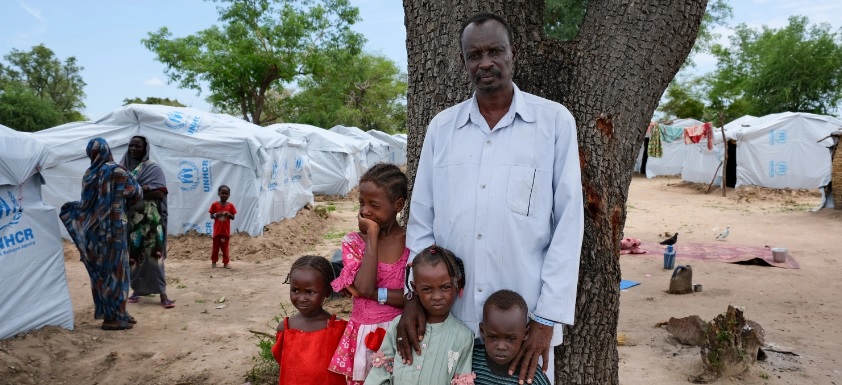
Aerial Raids on Nyala Drive More Refugees to Central Africa
moatinoon
The recent aerial raids carried out by the military on the city of Nyala and the extremely unstable living conditions in the city have led to a significant population movement from Nyala through the Um Dafuq border crossing to the Korsi neighborhood in the city of Bria, the capital of Vakaga province in the Central African Republic, according to the United Nations High Commissioner for Refugees.
The isolated area in North Central Africa is situated on the border with Sudan and Chad, relying on Sudan, especially the city of Nyala, for livelihood.
The UNHCR stated in its report for the period from January 11 to January 17 that the population of Korsi has doubled since January 2, 2024. Newly arrived refugees to the area reached 2,421, constituting 1,096 families (54% women, 51% children, 18% persons with disabilities).
In response to this increase, the UNHCR intensified its activities to accommodate the new arrivals. They increased water supply by 50%, doubled the distribution of hot meals, built shelters, and supported the registration and protection capacity, in addition to water, sanitation, and shelter support through support missions.
Regarding population movement and registration, the UNHCR mentioned that the "Korsi" refugee camp receives 260 refugees daily from Nyala, and local authorities reported that more people are on their way to the Central African Republic. Consequently, the camp now hosts 5,551 Sudanese refugees, constituting 2,767 families, the majority being women and children.
The UNHCR clarified that most Sudanese arriving in the Central African Republic are from Nyala and were already registered in 2023 in Um Dafuq. However, they decided to return to Nyala instead of moving to the Korsi camp designated by Central African Republic authorities. So far, the UNHCR and the National Committee for Refugees (CNR) have registered 10,614 Sudanese individuals, forming 3,632 families. There are additional refugees residing in small villages in other provinces besides those in the Korsi refugee camp.
Regarding protection measures, the UNHCR strengthened the capacity of the transit and registration center by rehabilitating four bedrooms, constructing two new registration rooms, and establishing a security center. These structures aim to improve reception conditions and enhance the efficiency of the registration process.
The UNHCR identified 269 persons with disabilities (cumulative total 432) among the newly arrived individuals during the reported period. This represents an increase of 106 individuals from the 163 identified in the first week of January. The United Nations Population Fund and its partner, Homme de Galil�e, continue to provide services for preventing and responding to gender-based violence.
Regarding shelter and essential relief materials, 105 shelters were constructed and allocated to families during the reported period. The UNHCR and its partners distributed 210 relief kits to 210 families, comprising 462 individuals. This brings the total beneficiaries to 359 families or 739 individuals since January 1. The materials include 410 mats, blankets, mosquito nets, 59 buckets and containers, 205 sets of kitchen tools and soap, and 760 solar-powered lamps.
The UNHCR distributed hot meals to newcomers in Korsi, integrating breakfast with evening meals provided since the beginning of the situation. Compared to the previous week, the UNHCRs partner Nourrir distributed four times the number of hot meals during the reported period, increasing from 616 meals per day to 2,257 meals per day. A total of 15,799 hot meals (7,686 breakfasts and 8,113 dinners) were provided during the week covered by the report. In total, 18,264 hot meals (7,686 breakfasts and 10,577 dinners) have been provided since January 1.
Regarding health, the medical team from NOURRIR and IMC working in health centers in Korsi provided 655 medical consultations, totaling 1,105 since January 1. Eighty-seven percent were for refugees, and 13% were for the host community. Children under 5 years old represented 48% or 314 children in 109 medical consultations since January 1.
The maternal and reproductive health team provided 31 consultations and assisted in the first delivery of the year. Nine new individuals joined the malnutrition treatment program, bringing the total to 22 since January 1.
Regarding water supply, sanitation, and general hygiene, the UNHCRs partner Nourrir built eight emergency toilets and eight emergency latrines during the reported period. The UNHCR and its partners worked on improving water supplies at the site. On January 8, 40 cubic meters of water were provided daily, or more than 10 liters per person, through a single water station. The average was then increased to about 15 liters per person daily but was reduced again due to the continuous influx of newcomers, to approximately 11 liters per person daily. The UNHCR and its partners are exploring solutions to enhance water supplies in the camp.

